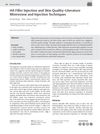Search
for
Sort by
Research
30 / 1000+ results
research Multi-Therapies in Androgenetic Alopecia: Review and Clinical Experiences
Multiple treatments work best for hair loss.

research Current Aspects of Polycystic Ovary Syndrome: A Literature Review
Polycystic ovary syndrome is a common hormonal disorder in women, linked to increased risk of metabolic and heart diseases, and needs more research for better understanding and treatment.

research Female Pattern Hair Loss: A Clinical and Pathophysiological Review
Female Pattern Hair Loss affects women's self-esteem and needs more research for better treatment.

research Immunomodulators in the Treatment of Cutaneous Lymphoma
Immunomodulatory therapies are effective for treating cutaneous lymphoma, particularly in early stages.

research Capillary Impacts of Covid-19: The Link Between Acute Telogen Effluvium and Alopecia Areata - An Integrative Review
Covid-19 can cause hair loss due to immune and psychological factors.

research Approaches to Lifestyle Management in Polycystic Ovary Syndrome
Lifestyle changes like diet and exercise are key for treating overweight women with polycystic ovary syndrome.

research HA Filler Injection and Skin Quality: Literature Minireview and Injection Techniques
Hyaluronic acid filler injections are a favored non-surgical method to improve facial aging signs due to their convenience, effectiveness, and durability.

research Pruritus, Allergy and Autoimmunity: Paving the Way for an Integrated Understanding of Psychodermatological Diseases
The conclusion is that understanding the complex relationship between allergies, autoimmunity, and psychological factors is key to treating skin disorders with itching.

research Cutaneous Androgen Metabolism: Basic Research And Clinical Perspectives
Creating stronger blockers for skin enzymes might lead to better treatment for conditions like acne and excessive hair growth.

research The Prevalence and Types of Androgenetic Alopecia in Korean Men and Women
AGA more common in men, Koreans have lower rates and unique patterns.

research Therapeutic Anti-Inflammatory Potential of Formyl-Peptide Receptor Agonists
Formyl-peptide receptor agonists could be new anti-inflammatory drugs.

research The Endocrinology of Baldness
Hormones and genetics play key roles in male and female baldness, which can affect mental health and may be linked to other health issues.

research Sexual Dysfunction Related to Drugs: A Critical Review. Part V: Alpha-Blocker and 5-ARI Drugs
α-Blockers and 5-ARIs for BPH can cause sexual dysfunction, including erectile and ejaculatory issues.

research Interactions Between Lower Urinary Tract Symptoms and Cardiovascular Risk Factors Determine Distinct Patterns of Erectile Dysfunction: A Latent Class Analysis
Men's age, urinary symptoms, and heart health risks create different types of erectile dysfunction.

research Pantothenic Acid Promotes Dermal Papilla Cell Proliferation in Hair Follicles of American Minks via Inhibitor of DNA Binding 3/Notch Signaling Pathway
Pantothenic acid helps mink hair follicles grow by affecting certain cell signals.

research Characterization And Neural Differentiation In Vitro Of Stem Cells From Human Deciduous Tooth Pulp
Dental pulp stem cells might not reliably become neurons.

research Index
The document is a detailed medical reference on skin and genetic disorders.

research Prevalence of Androgenic Alopecia in Women Aged 20-70 in Isfahan During 2008-2009
Almost 40% of women aged 20-70 in Isfahan had hair loss, with it being more severe in those with low ferritin levels.
research Androgen Treatment in Adolescent Males With Hypogonadism
Testosterone therapy helps boys with hormone deficiencies develop normal male characteristics and grow properly.

research Ameliorative Impact of High Inositol Diet on Insulin Resistance and Metabolic Hormones Among Women with Polycystic Ovary Syndrome
Eating a high inositol diet significantly improves insulin resistance and hormone levels in women with PCOS.
research Hydroxyl Radical Mediates Cisplatin-Induced Apoptosis in Human Hair Follicle Dermal Papilla Cells and Keratinocytes Through Bcl-2-Dependent Mechanism
Hydroxyl radicals cause hair follicle cell death during chemotherapy by reducing Bcl-2 protein levels.

research Polycystic Ovary Syndrome and NC-CAH: Distinct Characteristics and Common Findings. A Systematic Review
Polycystic Ovary Syndrome (PCOS) is common in women with conditions like anovulation, hirsutism, hair loss, and type 2 diabetes, and it can lead to health risks like heart disease, obesity, insulin resistance, and depression. Non-Classic Congenital Adrenal Hyperplasia (NC-CAH) is also discussed.

research Efficacy and Mechanism of Topical Shen Bai Hair Growing Decoction Against Androgenetic Alopecia
The Shen Bai Hair Growing Decoction may help treat hair loss by promoting hair growth and reducing inflammation.

research Aging Skin: A Window to the Body
Skin aging reflects overall body aging and can indicate internal health conditions.

research Are the Cutaneous Manifestations During or Due to SARS-CoV-2 Infection/COVID-19 Frequent or Not? Revision of Possible Pathophysiologic Mechanisms
Skin problems in COVID-19 patients are rare and may be due to the body's complex immune response or blood clotting issues.

research Classification of Psychodermatological Disorders: Proposal of a New International Classification
The document suggests a new way to categorize skin and mind disorders into two main groups to reduce confusion.
research Women’s Hair Loss: Pathophysiological, Diagnostic and Therapeutic Aspects
Accurate diagnosis and personalized treatment are crucial for managing women's hair loss.

research Frontal Fibrosing Alopecia: Literature Review of General, Pathophysiological, Diagnostic, and Treatment Aspects
Early diagnosis of alopecia frontal fibrosante is crucial, but treatment remains controversial and varies.

research Pathophysiological Mechanisms Implicated in Postpartum Depression
Postpartum depression is linked to changes in brain chemicals, inflammation, stress, and certain genes, and can potentially be identified by markers like specific steroids, serotonin levels, and vitamin D levels.